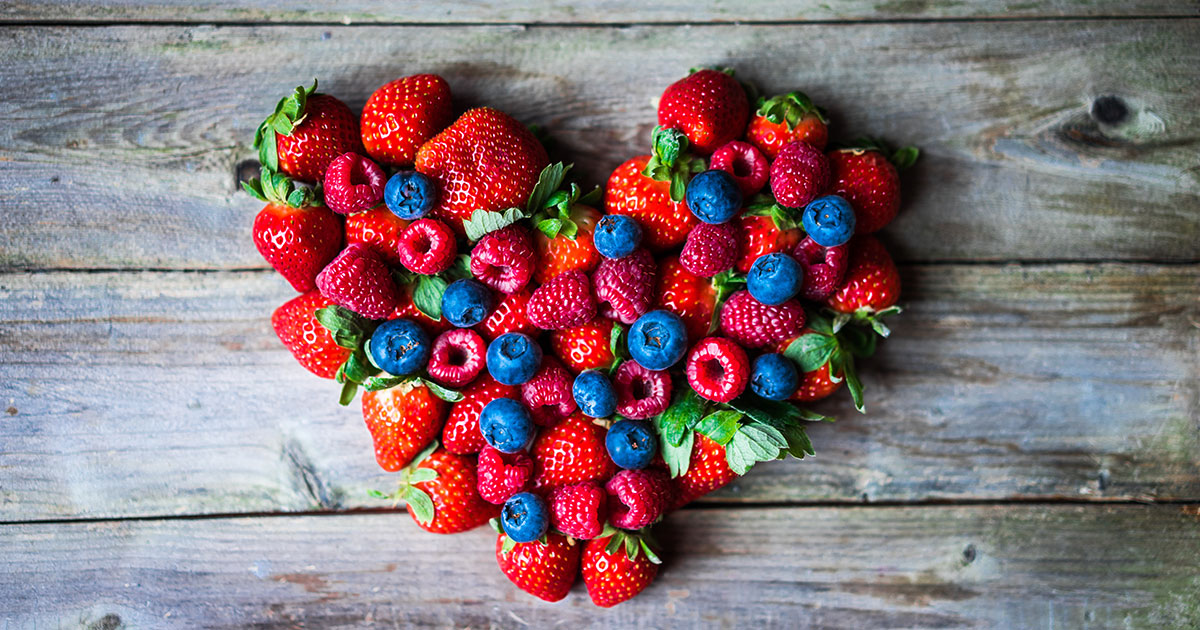Consumption of berries provides several compounds that promote cardiovascular health. Berries, for example, contain anthocyanins which discourage the formation of undesirable clotting. Pterostilbene, an active compound in blueberries, improves the production of nitric oxide. 1 In moderate amounts this marvelous molecule opens up the arteries, discourages platelet clumping, and protects from atherosclerosis.
Women who ate the most blueberries and strawberries had a 32-percent reduction in their risk of heart attack compared to women who ate the berries once a month or less. This was so even when compared to women who otherwise ate a diet rich in other fruits and vegetables. American Heart Association. “Strawberries, blueberries may cut heart attack risk in women.” ScienceDaily. ScienceDaily, 14 January 2013. www.sciencedaily.com/releases/2013/01/130114152954.htm.))
One study showed that individuals who ate at least one serving a week reduced their risk of developing hypertension by 10 per cent compared to those who did not eat blueberries.2
Consumption of blueberry powder for 8 weeks reduces arterial stiffness and both systolic and diastolic blood pressure in women with prehypertension and stage 1 hypertension. 3
Frequent consumption of blueberries could offer another benefit for individuals with high blood pressure. Over a period of time hypertension can damage the kidneys. Rodent studies show that long-term blueberry supplementation has the potential to delay or reduce the risk for development of hypertension-induced kidney damage. 4
Sure, blueberry juice offers benefits. However, if you are obese, or obesity runs in your family, consuming whole blueberries is so much better. Why? Obesity increases the risk for inflammation and hypertension by several molecular pathways. A high-fat diet induces obesity. Song and associates found that extracts from blueberry peels inhibited the creation of new fat cells and fat accumulation. It reduced weight gain in obese rats who had consumed a high fat diet. Additionally, the total cholesterol and triglyceride levels in the rats fed the blueberry peel extract were modestly reduced. The “good” HDL-cholesterol levels were significantly increased in rats feed the high-fat diet with blueberry peels compared to those rats fed just the high-fat diet. 5
Berries not in season yet? No problem! Freezing the blueberries actually improves the availability of the antioxidants.
Disclaimer: The information in this article is educational and general in nature. Neither Wildwood Lifestyle Center, its entities, nor author intend this article as a substitute for medical diagnosis, counsel, or treatment by a qualified health professional.
Sources
- Park SH. Pterostilbene, an Active Constituent of Blueberries, Stimulates Nitric Oxide Production via Activation of Endothelial Nitric Oxide Synthase in Human Umbilical Vein Endothelial Cells. Plant Foods Hum Nutr. 2015 Sep;70(3):263-8.[↩]
- University of East Anglia. “Bioactive compounds in berries can reduce high blood pressure.” ScienceDaily. ScienceDaily, 15 January 2011. www.sciencedaily.com/releases/2011/01/110114155241.htm.[↩]
- Florida State University. “Blueberries may help reduce blood pressure and arterial stiffness.” ScienceDaily. ScienceDaily, 8 January 2015.[↩]
- Song Y. Blueberry peel extracts inhibit adipogenesis in 3T3-L1 cells and reduce high-fat diet-induced obesity. PLoS One. 2013 Jul 25;8(7):e69925[↩]
- South Dakota State University. “Freezing blueberries improves antioxidant availability.” ScienceDaily. ScienceDaily, 22 July 2014. www.sciencedaily.com/releases/2014/07/140722124810.htm[↩]

